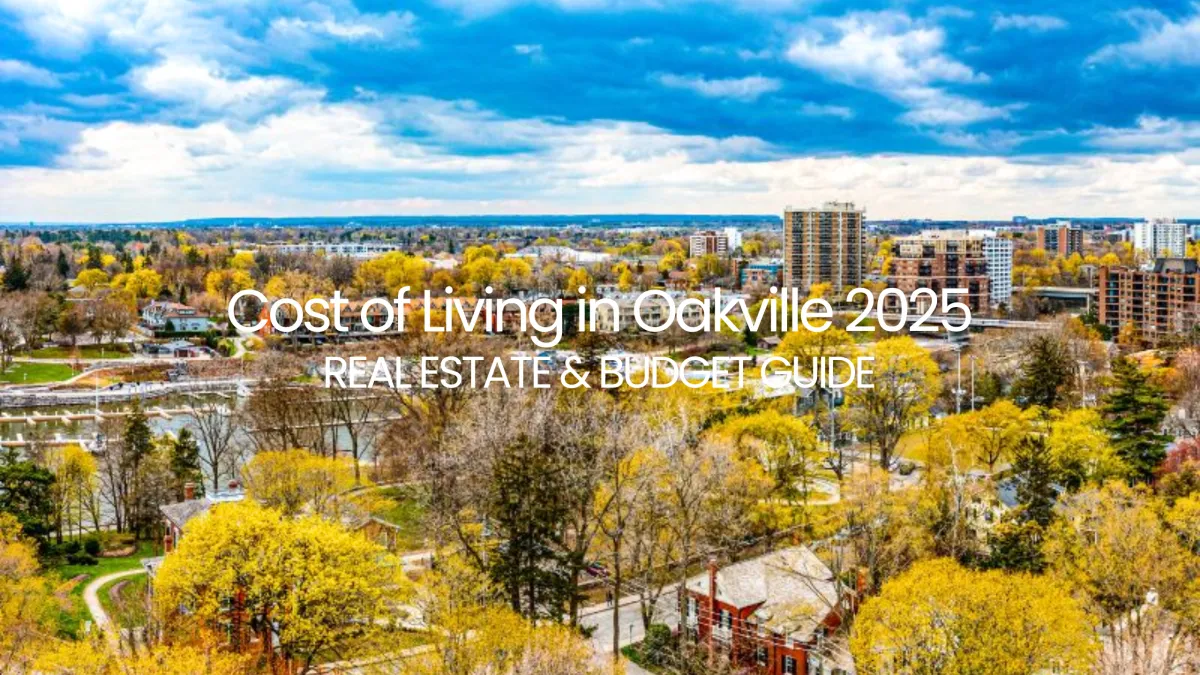
Cost of Living in Oakville 2025 | Real Estate & Budget Guide
🌟 The Cost of Living in Oakville in 2025
Oakville is the darling of the Greater Toronto Area: lakeside charm, robust suburban infrastructure, and easy access to Toronto via GO Transit. But with quality comes cost. Let’s explore what it really takes—budget-wise—to thrive here in 2025.
1. Quick Snapshot
Demographic - Monthly Expenses (CAD) - Notes
Single renter - $3,800 – $4,200 - Covers rent, food, transit, utilities (careerbeacon.com)
Single person (LivingCost.org) - $2,142 (incl. rent); $772 (excl. rent) - Ranks in global top 16%
Family of 4 - ~$4,900 (LivingCost.org) - Higher fixed household costs
Takeaway: For a single renter, Oakville typically demands $4K+/month, while a family of four often budgets $4.9K+/month.
2. Housing: The Major Cost Variable
✦ Rent
1-bed apartment (centre): ~$2,500; outside core: ~$2,233 (careerbeacon.com)
3-bed: City-centre can reach $4,750; suburban options around $3,320 (careerbeacon.com)
Zillow reports average market rent around $3,000 per month (vieirateam.com)
✦ Purchase Trends
Price per m²: $6,000–8,000 (downtown); $4,500+ (suburbs) (expatexchange.com)
For a 100 m² condo downtown, expect $600K–800K.
Mortgage rates have climbed—in 2025 average ~6–6.6% fixed .
3. Food & Groceries
Comparable to national average, but restaurant costs skew higher:
Bread (1 lb): $3.37 C$
Eggs (1 dozen): $4.58 C$ (salaryexpert.com, numbeo.com)
LivingCost suggests ~$571/month per person (livingcost.org)
Dining out: couples' dinner $100 on average; cappuccino $4.36; beer ~ $7.88 (mylifeelsewhere.com)
Pro tip: Regular cooking keeps you close to national averages; dining out and specialty items introduce premium inflation.
4. Utilities & Internet
Basic utilities for a 700 sq ft apartment: ~$123/month (mylifeelsewhere.com)
Internet (50 Mbps+): $70/month on average
Utilities + internet: $200–250/month.
5. Transportation
Oakville Transit monthly pass: ~$140
GO Transit monthly pass + parking: ~$313 (careerbeacon.com)
Gas prices: ~$1.60/L (vieirateam.com)
LivingCost puts transport at ~$87/month for individuals, $224 for families (livingcost.org)
Commuter tip: Driving brings additional costs—insurance, parking, maintenance—easily $300+ monthly.
6. Health, Education & Childcare
Provincial healthcare covers basics; private clinics/dental care extra.
Childcare/pre-school: ~$1,477/month for one child (mylifeelsewhere.com)
Private school: ~$23,888 annually for middle school (mylifeelsewhere.com)
Post-secondary (Sheridan, Appleby, etc.): factor tuition, commuting, living costs.
7. Entertainment & Lifestyle
Coffee out: ~$4–5; domestic beer: ~$7–8 (salaryexpert.com)
Festivals & community events: festivals like Kerrfest, Waterfront Jazz—mostly free or low cost (en.wikipedia.org)
Active living: Oakville offers clubs for lacrosse, hockey, swim, golf (Glen Abbey), outdoor fitness—all with fee tiers.
8. Tax Relief & Rebate Notes
Federal GST/HST relief expired February 15, 2025, but earlier provided relief on basics like food, clothing, kids’ items (en.wikipedia.org, en.wikipedia.org)
Ontario sales tax: 13% HST; income tax ranges ~5–13% (areavibes.com)
Integrate these when calculating take-home pay and post-tax budget.
9. Income Benchmarks & Lifestyle Feasibility
Average salary in Oakville: ~$81,800/year (2020 baseline) (careerbeacon.com)
Net take-home:
$55K gross → net ~$3,631/month (careerbeacon.com)
$85K gross → net ~$5,253/month
With $85K salary, there's healthy margin beyond ~$3.8K living cost; with $55K you’d run consistently tight.
Key insight: Aim for gross income ≥ $80K to maintain comfortable, middle-class living in Oakville.
10. How Oakville Compares
Cost index ~14% above Canadian average; housing sits ~26% above (areavibes.com)
Oakville ~27% higher than national cost index; ~19% above Ontario’s
Compared to Toronto: to maintain Toronto standards in Oakville, you'd need ~$8,590 vs $8,900 (numbeo.com)
It’s slightly less costly than Toronto overall, but different dynamics—housing location vs commuting trade-offs.
11. Where to Optimize
Housing location
Choose suburb vs downtown to reduce rent by 10–20%.
Explore secondary suites, townhomes with lower per‑bedroom cost.
2.Transit vs Auto
If working downtown, GO Transit pass may beat daily driving expenses.
If local, Oakville Transit + bikes + rideshares work.
Food & Dining choices
Shop at discount grocers (No Frills, FreshCo).
Prioritize home cooking for staples; reserve restaurant outings for social/family days.
Kids & Education
Choose public vs private schools based on budget-fit.
Explore subsidies, childcare tax breaks, co‑ops, and early education grants.
Health & Recreation
Utilize provincial health clinics, community rec centres ($4–8 drop-in).
Seasonal events (jazz, fairs) offer free social engagement.
12. What's New in 2025?
Mortgage rates are higher (~6–6.6%), dampening buy-side frenzy
Federal HST/GST relief programme briefly cut costs—ended Feb 15, 2025
Oakville population estimates: ~233,700 in 2024—crowding effects, more demand
Infrastructure & transit investment continue (William Halton Parkway extension).
Housing supply constraints continue to challenge affordability—but growing rental initiatives.
13. Summary & Advice
Living in Oakville in 2025 offers a blend of lakeside community, solid schools, and commuter accessibility. But quality comes with a premium: budget at least $4K+ per month for single renters—or $5K+ for families—to enjoy comfort.
To secure a smooth transition:
Plan for housing: choose size, location, tenure carefully.
Evaluate transportation trade-offs.
Align your income and lifestyle upfront: $80–85 K+ gross makes for ebullient living.
By thoughtfully budgeting, smart location selection, and strategically leveraging public transit and community resources, Oakville can be your home—and your investment—in 2025.
